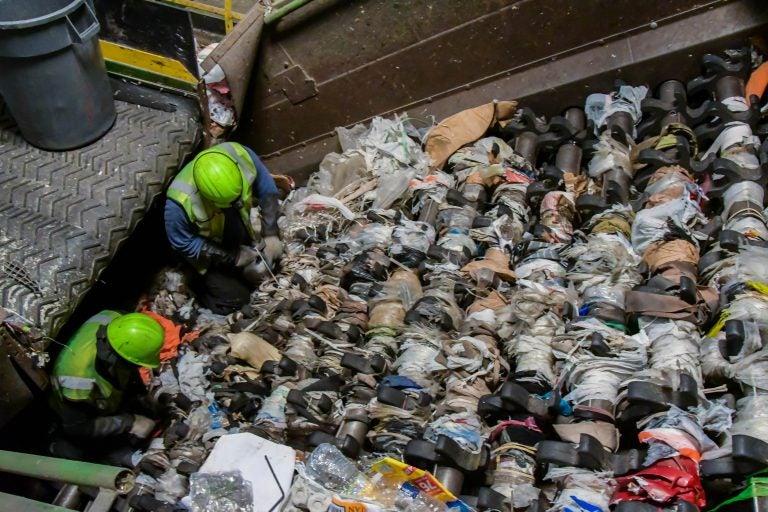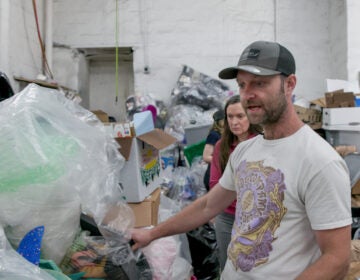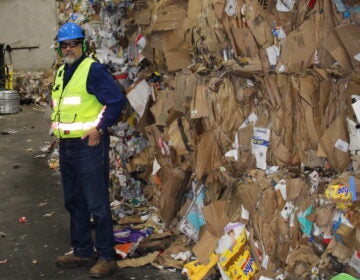Suburban Philly recycling programs address challenges as they settle into ‘new normal’
Programs in municipalities around Philly are adjusting as China’s stricter standards for recyclable materials appear permanent.

Waste Management technicians clear plastic bags and plastic sheeting from a recycling center screen. Plastic bags and sheeting are a major challenge for recyclers, as they snarl sorting equipment, cause contamination, and drive up processing costs. (Waste Management)
When China implemented stricter standards last year for the recyclable material it would accept, requiring it to be no less than 99.5 percent pure, many suburban Philadelphia municipalities cooled their heels to see whether the restrictions would eventually ease.
“That’s happened in the past,” said Frank Chimera, area senior manager of municipal sales for Republic Services, a major recycling processor in the region. “They’ve become restrictive for a few months, and then turned it around and started relaxing the standards again.”
That didn’t happen. If anything, China has signaled it will only become tougher on accepting America’s recyclable trash. And now, recycling programs face this challenge: finding a way to undo habits built up over decades, so that they can find markets for the incoming waste.
“For a long time, more was better, and a lot of programs were set up to drive more recycling,” Chimera said. “We ran that way as a country for probably 20 years.”
That was fine, as long as China was willing to take our waste, from soiled pizza boxes to dirty peanut butter jars. Now that the rules have changed, municipalities have had to adjust, in some cases changing their programs ‚ and, in nearly all cases, re-educating the public about what is recyclable material.
For Delaware County recycling manager Sara Nelson, that has involved creating a brochure for residents on how to recycle properly, outlining what is recyclable and what is not, and how to throw items out properly. (Wash out all jars. Break down all cardboard boxes. No plastic bags).
“People want to do the right thing,” Nelson said. “They just need to know what the right thing is.”
The difficulty, however, is that within Delaware County, individual townships have their own rules. Some take plastics #1 through #7. Others only take certain numbers. That’s the case in other outlying counties, too, including Montgomery and Bucks.
“There’s not a lot of standardization from township to township, city to city, state to state, on what is acceptable and what’s not,” Chimera said. “Some of that depends on the recycling facility that it goes to.”
One town may encourage residents to recycle egg cartons or orange juice cartons, while another a few blocks away may refuse those items.
“There’s all these little differences that make it confusing,” said Veronica Harris, recycling manager for Montgomery County.
She said a statewide standard would cut down on the confusion. So would a system where major packaging producers such as Coca-Cola, Unilever, and General Mills had more skin in the game.
One such model, known as an “extended producer responsibility” model, or EPR, involves a system in which producers take back their packaging. Canada has embraced that model, and Europe and California have been studying it.
“It puts the players at the table,” Harris said.
“Right now, we have no efficiency. We’re all just swimming in our little ponds, trying to figure things out as best we can,” she said. “But with EPR, now you have a system in place that really gets to the root of what’s going on and tries to make it cost-efficient and operationally efficient.”
Major companies are masters at logistics, she said, so they would slide easily into a role where they manage the recycling of their own packaging. But adopting such a program locally is still a long way off, she added.
“If California is studying it but hasn’t done it, Pennsylvania is going to be years behind that,” Harris said.
Some workarounds
In the meantime, many municipalities are focusing on getting back to basics. For some programs, like the one in Atlantic County, New Jersey, that has meant scaling back.
In December, the county stopped accepting plastics #3 through #7.
“There really is close to no market for that material any longer,” said Rick Dovey, president of the Atlantic County Utilities Authority.
The program also stopped accepting pizza boxes and has encouraged people to remove caps on bottles and jars before tossing them in the recycling, thereby reducing the probability those items might be filled with liquid that would contaminate everything else.
Despite the challenges, Dovey said, his program has never considered sending material straight to the incinerator, as Philadelphia has done for about half its recyclables.
“That’s just the wrong message totally,” he said. “That has not happened here, and it will not happen here.”
Ten years ago, during the recession, he said, commodity prices dropped and the Utilities Authority couldn’t market its material. Rather than burning it, the authority stored all its recycling on site for a full year, covering it with tarps, and sold it once the market began to recover.
That cost money, he said, but it was a better option than burning the material or sending it to a landfill.
Montgomery County’s Harris said Philadelphia’s decision to burn half its recycling probably set back an industry that struggled for decades to gain public trust.
“That’s an anomaly,” she said, referring to Philadelphia’s program. “That’s not the norm of what’s going on out there.”
What also isn’t the norm is the approach J.P. Mascaro and Sons, another local recycling firm, is taking. Rather than going back to basics, as many other companies are encouraging municipalities to do, J.P. Mascaro is upping the ante. It is about to embark on a pilot project with Resource Recycling Systems to test new equipment that will sort and recycle flexible plastic packaging, the bête noire of the industry.
“It is the complete opposite of what’s being preached in the industry,” said Joseph Mascaro, director of recycling and sustainability at J.P. Mascaro.
Flexible plastic — found in everything from food packaging to plastic bags — has been a huge headache for recyclers for years. The plastic gets stuck in sorting machinery, often gumming up the works and grinding the process to a halt, costing time and money and leading to contamination.
Yet plastic packaging is a reality of modern life and not one that is easily replaced.
“We do have to remember that there is a reason for packaging, and it is that it keeps our food fresh, and it keeps our food safe,” Harris said. “If we start backing up on food freshness, now we’re looking at a whole different waste problem, which is food waste.”
But when it comes to solid plastics like numbers 3, 4, 6, and 7, she said, it may be time to find replacements.
“They’re not easily recyclable,” she said. “They’re low-value, low-quality materials that we probably just shouldn’t be using anymore.”
WHYY is your source for fact-based, in-depth journalism and information. As a nonprofit organization, we rely on financial support from readers like you. Please give today.





